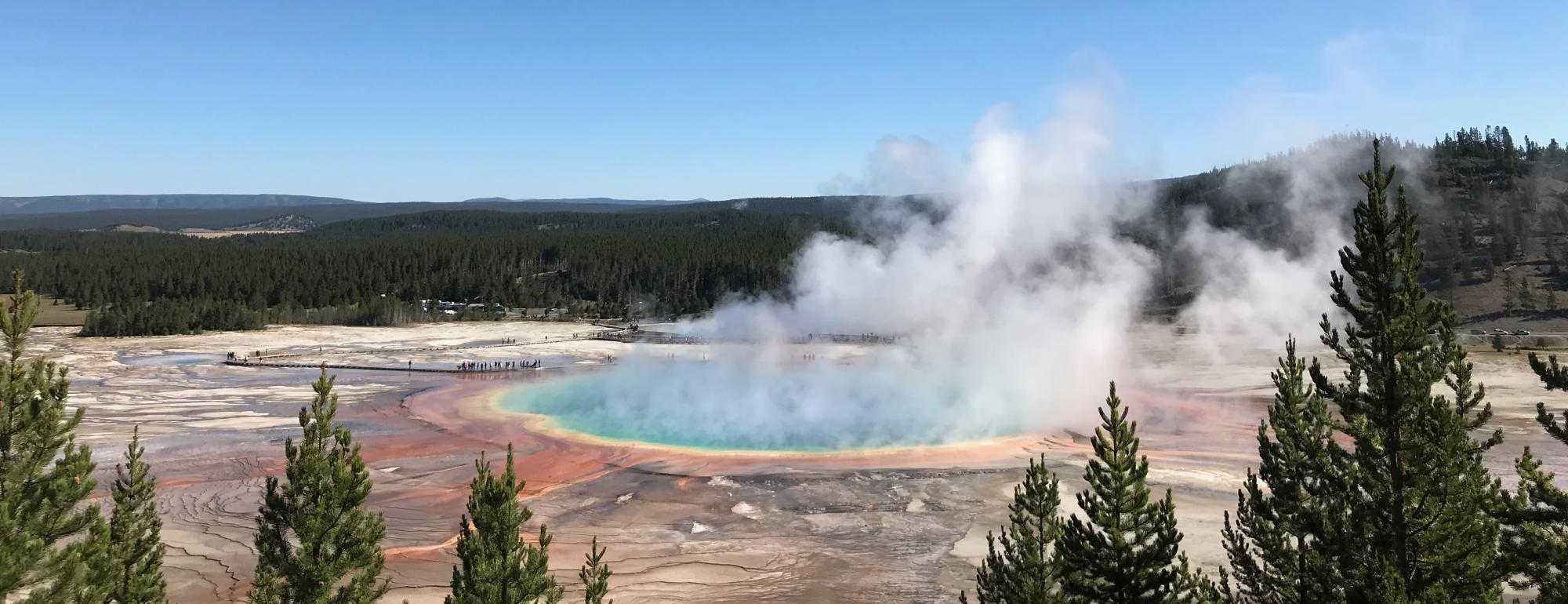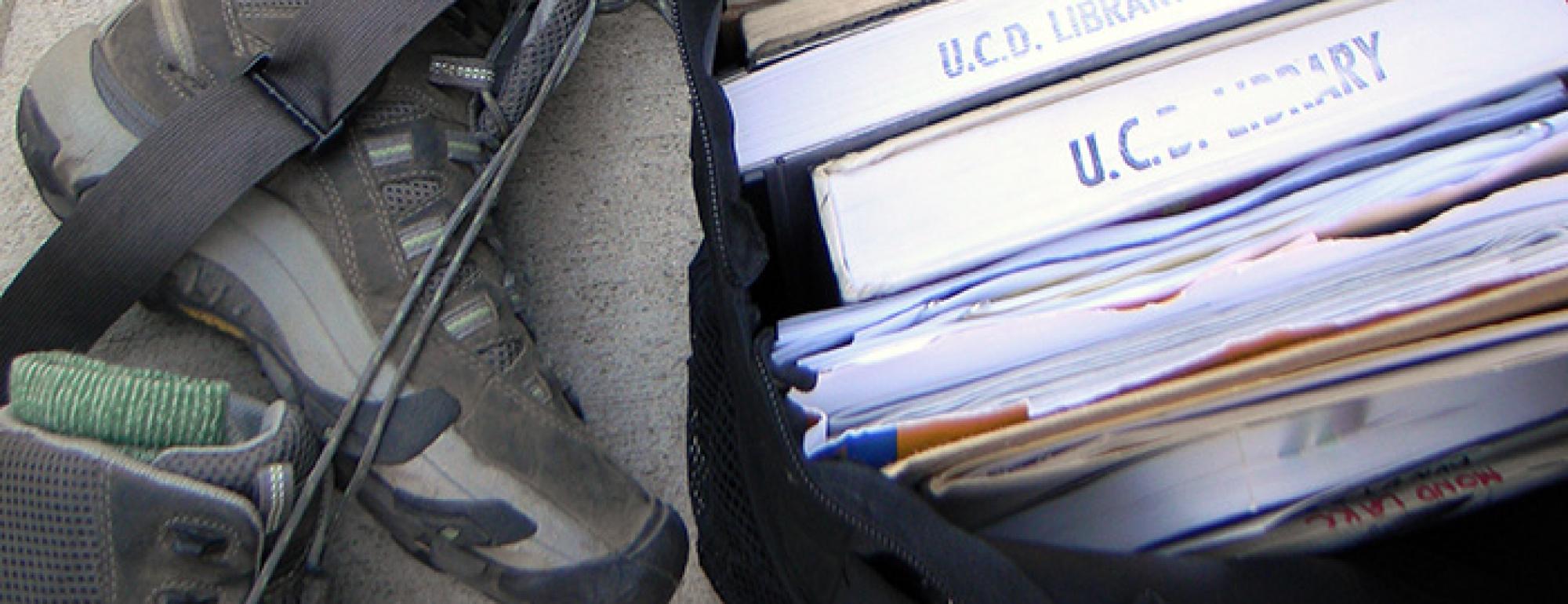
Apply now!
for Graduate Admission to UC Davis.
Important Application Deadlines
The Earth and Planetary Sciences Department application deadline for admission for the 2026-2027 academic year:
- General Deadline: January 5, 2026
All materials received by the General Deadline will receive full consideration by the Earth and Planetary Sciences Graduate Program. We typically fill all available positions from the pool of applications submitted by this deadline. - Space Available Deadline: May 1, 2026
The Space Available Deadline is provided for cases in which an opening becomes available after our normal review process is complete. Potential applicants who miss the General Deadline should contact prospective faculty advisors to determine if they should submit an application.
Internal Fellowship Application
The Internal Fellowship Application must be completed as part of the online application. In the online application, when asked if you will be applying for fellowships, please answer “yes”. Internal fellowships are due January 5, 2026.
Recruitment Weekend: The recruitment weekend will be March 12-14, 2026. As part of the last step in the application process, a subset of applicants will be invited to join the Recruitment Weekend to visit the department, UC Davis campus, the City of Davis and the surrounding region on a field trip.
How to apply to the Earth and Planetary Sciences Graduate Program at UC Davis
Admission the Earth and Planetary Sciences Graduate Program is a 5-step process, beginning with contacting potential mentors in our program and culminating with a visit to out department for a selection of candidates:
Step 1: Find faculty mentors
Before submitting an application to the program, you will need to determine if the faculty with whom you are interested in working will be accepting students during the upcoming admissions process. To do this, you need to send an e-mail to each of the faculty with whom you are interested in working. Our faculty are expecting to receive these e-mails and will respond. A template for this email is below. This e-mail also serves as an opportunity for you and the potential faculty mentor to learn about each other. A good time to send these e-mails is starting in early September up through the application deadline. To learn more about the faculty who are generally accepting graduate students see this list of Thesis Advisors. Our people pages contain brief descriptions of the research interests of our faculty and scientists. You can also read about the primary research groups in the department.
- Faculty Mentor Outreach Email template
- Dear Dr. Last-name,
I am writing to ask if you will be accepting new students into your research group during this year’s admission process. My name is [enter name]. I am an [undergraduate/Masters] student studying [enter major or thesis topic] at [enter institution name]. I am interested in pursuing graduate research at the [Masters/PhD] level in the topics of [enter topics]. [You can add more here about your research interests and how you’ve become interested in these topics]. Based on reading your research pages and seeing that you are conducting research on [enter topics], I believe that you may be a potential mentor for my graduate studies. [If you have read papers by this person or met them or seen them give a talk, you can add whatever reasons you have for concluding that you would be interested in doing research with them].
Please let me know if you will be accepting new students.
Sincerely,
Your name
[you can attach a CV if you have one] - Advice regarding covid impacts on applying to graduate school.
- We recognize that during the pandemic most students may not have had access to the traditional research experiences they were hoping for before applying to graduate school. Having direct research experience is not a requirement for applying to graduate school: there are other ways of demonstrating your preparedness and commitment to attaining a graduate degree. We recommend that, if applicable, you use part of the statement of purpose to write about:
• any planned research activities that were canceled and any other activities you did instead. For example, if instead of a planned lab experience, you conducted a literature review; write about both the original plan and what you did instead.
• the kinds of research questions you are interested in and why, as well as the skills you have acquired from your coursework that have prepared you for the research project, as well as the skills you envision building up as you take on graduate research.
• work experience you have had, the skills you have gained in the position, how you envision those skills supporting you as a graduate student, as well as the skills you envision building up as you take on graduate research.
In addition to knowledge-base and technical skills, there are many transferable skills that factor into student’s preparedness for graduate school such as resilience, perseverance, adaptability, planning and organization, working in teams or independently, and speaking and writing skills. Writing about specific examples that demonstrate any of these other skills within your statement of purpose or personal statement will also provide essential information to the admissions committee.
Step 2: Complete the application
Complete and submit the online application.
- The application portal opens in mid-September
- All application materials must be received by UC Davis by January 5 (except for space available applications)
- Check your application portal to make sure all application materials have been received
- A complete application consists of the following:
- Statement of Purpose
- Personal Statement
- List of Faculty Mentors
- CV/resume
- Three letters of recommendation (to be submitted electronically by the recommenders; instructions are in the online application)
- TOEFL or IELTS scores (International applicants)
- Unofficial transcripts from previous institutions attended
- Application fee of $135 (U.S.) or $155 (international). Application Fee Waivers are available for students who participated in specific Graduate Preparation programs. The EPS Graduate Program cannot offer additional Application Fee Fellowships at this time.
Note that as of July 2020 the UC Davis Earth and Planetary Sciences Graduate program (EPSGP) no longer requires GRE scores. Additionally, there are no specific prerequisite courses required.
- Department of EPS Admission Essay Advice
- UC Davis Graduate Studies provides guidelines for writing your Statement of Purpose and Personal Statement for graduate admissions. Additionally, here are some things to consider when writing your statements for the UC Davis Earth and Planetary Sciences Graduate Program:
1. Graduate school is a multiyear commitment learning and conducting research: what motivates you to apply to our specific program and what motivates you to attend graduate school at this time?
2. Describe a time when you took initiative on something, either academic or outside of academics, that highlights some of these traits: independence, curiosity or problem-solving skills.
3. Consider a past experience of being part of a team (academic of extra-curricular) and tell us about the how the role(s) you played on the team (leader, synthesizer, heavy-lifter, etc) contributed to its success. Also, describe what you learned about successful teamwork and/or team culture through the experience.
4. Tell us about your perseverance and maturity: briefly describe a challenging time (one in which you did not fully succeed) and describe how you responded to that experience and what you learned from the experience. Then, also briefly describe an experience where you struggled through a challenging time but eventually succeeded. How did you get through that struggle and the stress associated with it?
Step 3: Application review
Starting in late December/early January the Admissions Committee reviews all parts of the written application materials. Our admissions rubric (below) is available for review and is designed to guide committee members and potential advisors in a holistic review of each candidate in the context of their individual academic experience. The Earth and Planetary Sciences Graduate program is committed to creating a community that respects each person as an individual: we promote and value diversity, creativity, and rigorous intellectual inquiry for all members of our program. From this holistic review, The Admissions Committee creates a list of applicants who meet the requirements for admission and shares this with the faculty.
In the review process we are looking to identify candidates with strong academic preparation and demonstrated potential to successfully carry out mentored research (either through research experiences or other activities). We have found that the following traits support a student’s success in graduate school: 1) perseverance, 2) independence, 3) curiosity, 4) ability to work in teams, 5) maturity, and 6) communication skills (written and oral). While we don’t expect each candidate to excel at all of these traits, we do expect candidates to demonstrate strength in many of these and encourage you to share experiences in your application statements that show your strength in these skills and considers how you might grow these skills once in graduate school. Addressing the application statement prompts is one way to include this information in your application. You may ask your recommenders to specifically address these traits in their recommendation letters.
- Department of EPS Admission Rubric
- Note strengths and weaknesses and evidence for these in the admission package, along with a score of 1-4:
-Student is persistent and adaptable
-Student is motivated to pursue scientific research
-Student has taken advantage of (or made) opportunities in seeking out research experiences
-Student can work well independently and is self-directed.
-Student works well with others and responds well to constructive feedback
-Student communicates in a clear, organized and logical manner.
-Academic record includes appropriate coursework and level of competence to build from for graduate level research in expressed subdiscipline.
In this part of the process, the faculty evaluate the list of applicants to find strong ‘matches’ between the prospective students and their research program. Finding the right match involves first and foremost identifying faculty who share research interests with the prospective student, but also who have space in their laboratory group and can contribute to the financial support of the prospective student. For this step to be successful, it is essential that prospective students contact faculty whose research groups they are interested in joining and inquire about whether the faculty member is planning to accept new student (see step 1 above)
Step 4: Recruitment weekend visits
Candidates who are successfully identified as matching the research interests of one or more potential faculty advisors (who have also expressed to the EPSGP Admissions committee their serious interest in having the prospective student join their research group), will be invited to campus during the recruitment weekend. This recruitment weekend is typically in early March. This in-person visit is an essential final step in determining if the hoped-for match between prospective student and sponsoring faculty member exists. It is an opportunity for both the applicant and the potential faculty advisor to check each other out. During this visit we are also assessing the student’s ability to communicate about science, engage constructively in scientific critique and discussion, work collaboratively in a research lab or group, and conduct themselves in a professional manner. This visit is paid for by the Department of Earth and Planetary Sciences.
Please note that the Earth and Planetary Sciences Graduate Program only accepts students for whom the program and/or faculty advisor can provide academic year funding in the form of a Teaching Assistant (TA), Reader, and/or Graduate Student Researcher (GSR) stipend or other fellowship. Academic year GSRs and summer GSR stipends are provided by the faculty advisor. Therefore, the number of admitted applicants will be limited by the funding resources available.
Offers of admission to the Earth and Planetary Sciences Graduate Program are generally sent out approximately one week following the recruitment weekend visit.
Please direct any questions regarding admission to the Earth and Planetary Sciences Graduate Program to the Graduate Program Advisors and Coordinator at eps-graduate-advisors@ucdavis.edu
We wish you every success!


